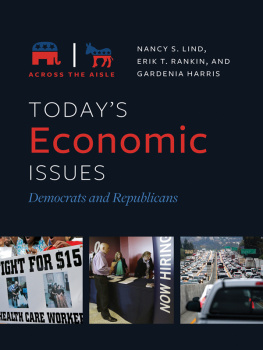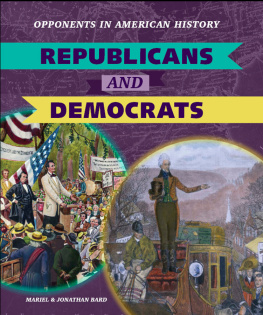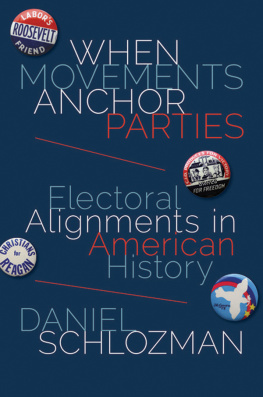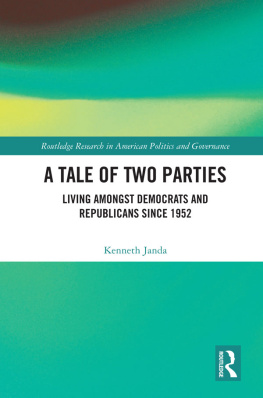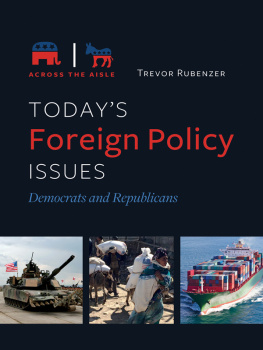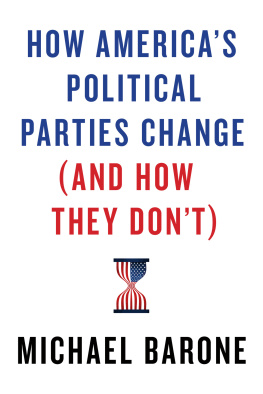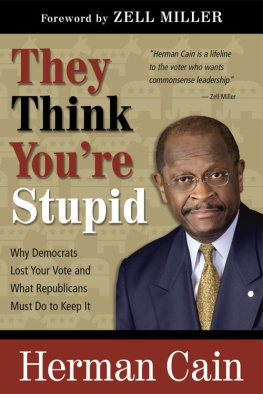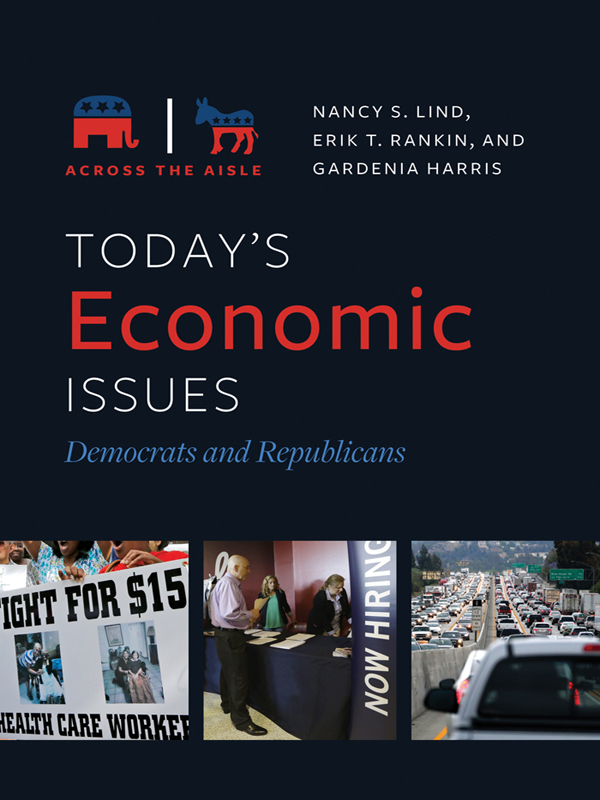Todays Economic Issues
Recent Titles in the Across the Aisle Series
Todays Social Issues: Democrats and Republicans
Timothy W. Kneeland
Copyright 2016 by ABC-CLIO, LLC
All rights reserved. No part of this publication may be reproduced, stored in a retrieval system, or transmitted, in any form or by any means, electronic, mechanical, photocopying, recording, or otherwise, except for the inclusion of brief quotations in a review, without prior permission in writing from the publisher.
Library of Congress Cataloging-in-Publication Data
Names: Lind, Nancy S., 1958- author. | Rankin, Erik, author. | Harris, Gardenia, 1961- author.
Title: Todays economic issues : Democrats and Republicans / Nancy S. Lind, Erik T. Rankin, and Gardenia Harris ; foreword by Joseph R. Blaney.
Description: Santa Barbara, California : ABC-CLIO, 2016. | Series: Across the aisle | Includes bibliographical references and index.
Identifiers: LCCN 2016025878 (print) | LCCN 2016029465 (ebook) | ISBN 9781440839368 (print : alk. paper) | ISBN 9781440839375 (ebook)
Subjects: LCSH: United StatesEconomic policy2009- | United StatesSocial policy1993- | Economic securityUnited States. | Public welfareEconomic aspectsUnited States. | Democratic Party (U.S.) | Republican Party (U.S. : 1854-)
Classification: LCC HC106.84 .L56 2016 (print) | LCC HC106.84 (ebook) | DDC 330.973dc23
LC record available at https://lccn.loc.gov/2016025878
ISBN: 978-1-4408-3936-8
EISBN: 978-1-4408-3937-5
201918171612345
This book is also available as an eBook.
ABC-CLIO
An Imprint of ABC-CLIO, LLC
ABC-CLIO, LLC
130 Cremona Drive, P.O. Box 1911
Santa Barbara, California 93116-1911
www.abc-clio.com
This book is printed on acid-free paper 
Manufactured in the United States of America
Contents
by Joseph R. Blaney
Differences between Democrats and Republicans: In Their Own Words
When discussing the fundamental differences between Democrats and Republicans on economic issues (or any issues for that matter) it is helpful to understand that politics is primarily a comparative process. As William L. Benoit, Joseph R. Blaney, and P. M. Pier advanced with the Functional Theory of Political Communication, in participatory democracy, candidates engage the electorate by trying to appear preferable (Benoit, Blaney, and Pier 1998). This is done by pointing to ones strengths (acclaiming), detracting from the opponents strengths (attacking), and responding to attacks with potential to damage ones candidacy (defending). Understanding that all political discourse can be categorized into this tri-partite schema is essential to understanding politics (Benoit, Blaney, and Pier 1998). However, the Functional Theory offers further levels of categories for consideration. For instance, political messages can be further categorized as dealing either with policy or character. Policy considerations (the subject of the remainder of this book as it concerns economics writ large) can include past deeds, future plans, or general goals. Character considerations can include ideals (ideology), leadership qualities, and personal qualities (Benoit, Blaney, and Pier 1998). The framework of Benoit and his colleagues has been applied in dozens of studies addressing television and radio advertisements, press releases, nomination acceptance speeches, convention keynote speeches, primary and general election debates, talk radio appearances, direct mail and social media campaigns. In short, it is the gold standard for understanding the nature and function of political communication. Couple this with the notion that political reality is defined by communication. Berger and Luckmann (1966) made a very strong argument for the idea that our social realities (i.e., the way we view the world and assumptions we make about everything from gender roles to division of labor and wealth) are completely a matter of construct between persons as they exchange symbols and create shared social environments. As political audiences understanding of politics is similarly socially constructed through the messages they consume, the key differences between Democrats and Republicans can be illuminated by political function analyses of the last 20 years. In Communication in Political Campaigns, Benoit (2007) found that party affiliation influences messages produced by political candidates. In particular he shed light on the potential effects of affiliation on the functions (acclaiming, attacking, or defending) and topics (policy or character). Specifically, he found that when looking at discourse in general (not differentiating advertisements, speeches, etc.), Democrats were slightly more likely to attack and Republicans were slightly more likely to acclaim. Both parties used only 2 percent of their discourse to defend themselves. He also found that Democrats discussed policy more, and character less, than Republicans (Benoit 2007). However, in terms of relevance to this book, the question of issue ownership may be the key to understanding the nature of differences between parties/candidates and what they would ask us to believe about the political and economic state of affairs.
Petrociks Theory of Issue Ownership holds that over time voters believe that one party is better suited to address particular issues. For instance, the public holds the belief that Democrats are better able to advocate for health care, education, social security, and the environment, while Republicans better represent the countrys interests with respect to taxes, national defense, and terrorism prevention. To the extent that the voting public holds these prejudices about parties and issues one can claim that a party owns an issue or issues (Petrocik 1996). Given this, the modest differences in function and topic that Benoit found could be attributable to the fact that some issues are more important in a given year, leaving a partys ownership of an issue (and ability to acclaim its record, as opposed to attacking an opponents record) a central focus of a campaign. For instance, as national security was very important in the 2004 election, one might not be surprised that the Republican Party and candidates acclaimed themselves for the policies they implemented. Likewise, as the national economy was sinking during the 2008 campaign, it is not surprising that the Democrats attacked Republican policies as the culprit. In short, the functional discourse of a party will necessarily adapt to the political environment as it presents opportunities and challenges to the parties based on their ownership of issues.
Why begin a book about the differences between Democrats and Republicans with an understanding of how election campaigns socially construct economic issues? Because the parties and candidates themselves beg for us to understand economics from frames that suit their desired policies. Only when parties are given power via consent of the electorate can their policies be pursued and implemented.
Is the attention in this book given to differences between Democrats and Republicans on economic issues merited? The political communication research supports an unequivocal yes to this question. The vast majority of political communication (i.e., speeches, advertisements, talk radio appearances, etc.) ultimately addresses economic issues. Benoit, Blaney, and Pier (1998) found that political discourse could be categorized as addressing issues the following amounts of time: the economy (22 percent), education (20 percent), Medicare and health (15 percent), taxes (9 percent), and crime and drugs (6 percent) with 28 percent of all discourse addressing other sundry topics (e.g., national defense, social issues, etc.). However, their understanding of economy was too narrow. The chapters in this volume point to a much broader understanding of economic issues, one that would collapse education, Medicare/health, and taxes under the economic umbrella accounting for

